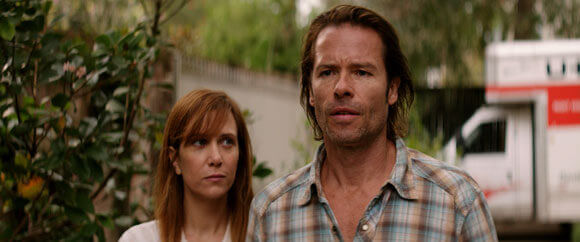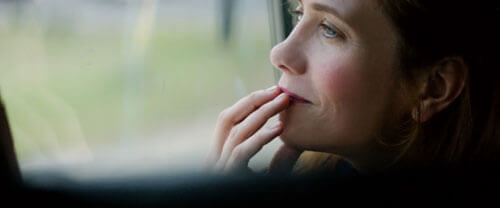
Writer/director Liza Johnson follows up her critically acclaimed feature film debut Return with Hateship Loveship, a compelling drama based on a story by Alice Munro. The cast of Hateship Loveship includes Guy Pearce, Hailee Steinfeld, and Jennifer Jason Leigh, but it’s Kristen Wiig’s character who’s the heart and soul of the story. Wiig is best known for her work in comedies, however in Hateship Loveship she takes on the part of a naive and sheltered woman unlike any character she’s played before.
The Plot:
Johanna Parry (Kristen Wiig) is a profoundly shy, unadorned woman who is hired by Mr. McCauley (Nick Nolte) as a housekeeper and a primary caregiver to his granddaughter Sabitha (Hailee Steinfeld). Despite her outgoing nature, Sabitha carries wounds from the death of her mother years before, complicated by the circumstances of that death for which her grandfather still blames her father, Ken (Guy Pearce), a hapless recovering drug addict with a certain ragged charm. In an act of mean-spirited rebellion, Sabitha uses technology to foster a pseudo-relationship between Johanna and her father, never dreaming of the potential harm to either party. Sabitha doesn’t understand that Johanna is not a demure cut-out, but rather a woman for whom the phrase “still waters run deep” could have been coined. The young girl’s interference provokes Johanna to indulge in something long missing from her life: the dream of a future and a home of her own.
Liza Johnson Hateship Loveship Interview
What does the title of the film mean to you?
Liza Johnson: “It comes from this Alice Munro story which is actually a longer title called Hateship, Friendship, Courtship, Loveship, Marriage. You see the girls play that game in the movie for a short time. It’s a little bit like he loves me, he loves me not where you spell out the name of a boy on your hand. You figure out what your future is. For me, in the original story that it comes from, it seems to me that those girls are living in a world where they know what is supposedly the proper normative biography for a woman to have. They’re trying to live it out, where Johanna does not have those expectations.
I think Munro intends the title somewhat ironically. She’s so unsentimental. Obviously most people’s lives don’t go that way. Mine is usually loveship, then hateship, then nothing. Then maybe dateship. Possibly some sexship, then nothing, then hateship. I think that because the story really suggests that a woman’s biography can go much differently, that partly that title is in there almost ironically to suggest that these expectations are a child’s game but real life is a whole different matter.”
Was Johanna your entry into the story? Is she the character you connected with as your entry point?
Liza Johnson: “I definitely do see her as the spine of the story. She is the one that I connected to largely because I thought it was so interesting the way that she comes from a world where it doesn’t really do her any good to want things that she can’t have. Then, when the girls trick her, she really has to grow into the idea that she can have a desire and really put herself at risk for it.
To me, that is something that we have to do as people, and maybe in a particular way as women. I was just very attracted to that aspect of the story. That’s kind of my way in.”
Do you have to like all of your characters as a director, despite the fact they might not have any redeeming qualities?
Liza Johnson: “I do like them all. For me, it also goes back to the source material. I don’t know if you got a chance to read the Alice Munro story but she’s not sentimental. It’s not like she thinks everybody’s good people or whatever. Every person in that story is acting out of an empathetic place. I would say even more than in the movie, in the story it’s really quite clear that the girls do a mean action but they’re doing it because they’re embarrassed. Hailee Steinfeld’s character is always embarrassed because her dad’s embarrassing her. Edith [played by Sami Gayle] is always embarrassed because she doesn’t have as much money as the other people. They’re always just reacting to their own station in the world. Even though they don’t always make good decisions or do what you would call nice actions, you can understand the impulses that they’re reacting off of.”
Can you talk about why Kristen Wiig was the right choice to play Johanna?
Liza Johnson: “I think she’s a really major talent in a way that’s really visible in her comedy, which I think is the work that people know her best for, obviously. That’s fair, right? She’s so beloved for that, that I think that really comes to dominate people’s impressions of her work. I understand that because her comedy is awesome. At the same time, she has done a lot of work where you can see her capacity to perform in more than one register.
Bridesmaids, in my opinion, is hilarious. It’s a very funny movie with a lot of broad comedy in it. But in between the broad comic set pieces, she’s doing a lot of very quiet, kind of sad stuff. People are giving me a certain amount of credit as if I knew something through magic, but it’s actually on the screen. It’s just that the comedy is so memorable that people forget about it. I never had any doubt in her capacity to do more dramatic or restrained registers of performance.”
Liza Johnson: “We had a great time working on all that stuff together. I wouldn’t say that we rehearsed, but we talked a lot about the roll a lot before we did the movie. We worked on it with the costume designer. We had a lot of chances to talk about the physical work of the character. Obviously, that’s something that’s in common between dramatic acting and comic acting where she’s had a lot of experience on Saturday Night Live, creating a character in a really short amount of time. I feel like she has a lot of craft that comes from that in thinking about the physical work.”
You’ve assembled some terrific supporting players in Hateship Loveship. Was there any actor in particular you wish you could have had on the set a little bit longer?
Liza Johnson: “Oh, yeah. In particular, I wish we had more scenes for Jennifer Jason Leigh. I think she’s just an incredible performer. I was really glad that she was excited to come and do what I would essentially call a cameo role. I think that it’s a testament to Kristen that her work is so strong and so compelling to the rest of that ensemble. I think that her talent galvanized them. Jennifer Jason Leigh is one of the strongest actors I’ve ever seen in my life. The idea that she would come on our set for three days and blow in there for that performance and then blow back out. I think that’s a testament to how much people respect Kristen’s talent.”
As a female director, do you find the industry is changing and allowing female voices to be heard more than, say, even 10 years ago?
Liza Johnson: “I hope so. I still do know a lot of really talented female directors. I don’t really know if it is changing. I certainly hope so. All I can say is I’ve had really good experiences with the men and women that I work with. I don’t personally feel like I’m suffering for my fair gender.
I do know that it isn’t structurally even. I haven’t met anyone that just is really like, ‘Oh, women can’t direct.’ I have met people who think that some of the female protagonists don’t have any foreign value so you have to make them for $5.00. I can only just say how compounded that is if you’re working with subject material about people’s color, or queer people or queers of color. I think that there’s a really tenacious crowd of women directors and directors of color who are really committed to making that subject matter happen. What I would like to see is for it to become clear that the marketplace does support that. I think Bridesmaids was really helpful in the regards. I hope that other movies are also demonstrating that there is a market for subject matter that people aren’t certain whether there’s a market for.”
Follow Us On:


 Stumble It!
Stumble It! 




